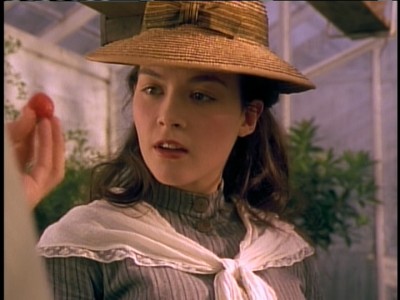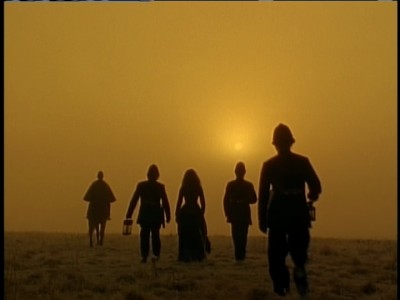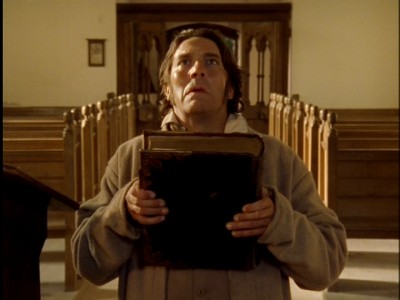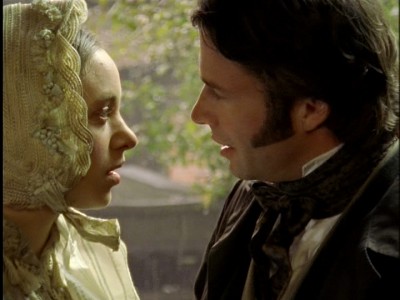| Reviews & Columns |
|
Reviews DVD TV on DVD Blu-ray 4K UHD International DVDs In Theaters Reviews by Studio Video Games Features Collector Series DVDs Easter Egg Database Interviews DVD Talk Radio Feature Articles Columns Anime Talk DVD Savant Horror DVDs The M.O.D. Squad Art House HD Talk Silent DVD
|
DVD Talk Forum |
|
|
| Resources |
|
DVD Price Search Customer Service #'s RCE Info Links |
|
Columns
|
|
|
Thomas Hardy Collection

Adapting classic novels for the screen can be a tricky business, but perhaps the little screen is better suited for it, at least in a way, than the silver one. That would be because the biggest challenge to transforming a novel into cinema is making it into something actually "cinematic," and you can get away with a lot more of a novel's intricacies of plot detail and exposition in the context of the extended-duration, small-screen format, which has traditionally put more stress on dialogue and technical straightforwardness to drive its narratives accessibly forward than on the narrative compression, heightened visual sensibility, and creative editing that it takes to structure and sustain a 90 to 120-minute theatrical feature. There are exceptions, of course. Todd Haynes's Mildred Pierce and Fassbinder's Berlin Alexanderplatz are TV miniseries that are very cinematic, while big-screen adaptations (Mira Nair's Vanity Fair and the 1998 Les Misérables come to mind) can feel weighted down, limited by overly strict adherence to and reverence for a novel. And those TV norms have certainly shifted in recent years; The Sopranos and Mad Men are more cinematic than many films. But it is the more traditional, perhaps more novel-appropriate, uncinematic TV sensibility that we find in a pair of two-part movies, originally made for Britain's ITV and the A&E cable network from novels by the great late-19th-century English novelist Thomas Hardy, now being released together by A&E home video as The Thomas Hardy Collection: Tess of the D'Urbervilles (1998) and The Mayor of Casterbridge (2003). Each film has a different director and creative team (and, of course, cast) behind it, but both were written by BBC-veteran scribe Ted Whitehead, and that both seem to be cut very much from the same cloth despite their different production personnel suggests that, in keeping with TV practices of yore, the strongest creative emphasis is on the written aspect and not the visual.

Tess of the D'Urbervilles stars Justine Waddell (The Fall) as the poor country girl of the title, whose drunk, underemployed father learns that their very humble (not to say humiliated) family, the Derbyvilles, actually belongs to an ancient aristocratic lineage, the D'Urbervilles. This completely coincidental discovery sets in motion a chain of events that separates the levelheaded Tess from her family (who need her pragmatism and energy) as, pressured by their haplessness and poverty, she seeks to use the newfound ancestral connection to move up in the world. Her reluctant quest for upward mobility puts her in the path of Alec D'Urberville (Jason Flemying, Hanna), an ostensible cousin (the business of aristocratic names and families can be very misleading, surely part of Hardy's point) who develops a mad passion for Tess that she, attracted to his devilish charm in a way she is too sheltered to fully understand, is unable to resist. Their affair results in a pregnancy and leaves her "impure" by the sexual mores of the time, and she flees Alec, abandoning her unwanted mandate to ride the family coattails. But the shadow of their dalliance hangs over her eventual engagement to her true love, the idealistic Angel Clare (Oliver Milburn), whose principles cannot overcome his wounded pride when he discovers Tess's past; he leaves her behind and sets off to lick his wounds, leaving her vulnerable to the still persistent attentions of the self-involved, possessive Alec. Will Angel come to his senses, realize his and Tess's love was true despite her prior sexual experience, and return to rescue her before she gives up hope and succumbs to a loveless marriage? Throughout the story, Tess is whipped around by the indifferent winds of fate and society, which seem to react to her extraordinary practicality and independence with a grim resolve to render her emotionally discombobulated and unwillingly dependent.

I consider The Mayor of Casterbridge, fine as it is, a somewhat inferior novel to Tess, and so, too, is the film the lesser of The Thomas Hardy Collection. It does, however, boast a fairly captivating lead performance by Ciarán Hinds (There Will Be Blood, Life During Wartime) as the titular mayor, Michael Henchard, who, 19 years before (as we are shown in a prologue), was a drunk and destitute wanderer who auctioned his wife, Susan (Juliet Aubrey, The Constant Gardener) and infant daughter at a fair to the highest bidder, a sailor who, it turns out, made a much better husband and father than Michael would have. After this shameful episode, he swears off drink "for 21 years" and becomes a successful farmer and mayor of the agricultural town of Casterbridge. When we meet up with him those 19 years on, he is in the process of replacing the incompetent manager of his corn concern with a sharp and principled Scotsman, Donald Farfrae (James Purefoy, Rome), with who is able to turn his lagging business into a huge success. When the now-widowed Susan arrives in Casterbridge, accompanied by their grown daughter, Elizabeth Jane (Jhodi May, The House of Mirth), Henchard hastens to make amends by remarrying her, though his need to integrate her and Elizabeth Jane into his now-respectable life without losing his respectability involves a degree of covertness and duplicity that ultimately jeopardizes everything. His further attempts to compartmentalize his past by distancing himself from a woman, Lucetta Templeman (Polly Walker, Rome) from a nearby town whom he has seduced and is engaged to marry, worsens matters. After the wise but ailing Susan passes away and leaves him without her salutary influence, and with a sort of insanely complicated love quadrangle then developing between himself, Elizabeth Jane, Farfrae, and Lucetta--all with his stubborn, reckless pride constantly interfering and fraying his relations with anyone and anything that might help him--Henchard has an overwhelming number of obstacles standing in the way of finally making amends for his past cruelties and errors.

With their author's acute, tragic sense of the indifference of fate and coincidence to our rightful longings and good intentions, Hardy's stories are, on the page, rightly venerated as literary art. As they are presented on the screen here, mostly in the default, flatly expository TV mode--faithfully adherent to the novels' plots but without the benefit of language to fluidly limn all the contours of their people and events--they are just melodrama with a philosophical bent. There are worse things, of course, and these little teleplay adaptations are perfectly engaging and watchable. But they are very much the usual kind of novel-to-screen failure (or, at best, very compromised, provisional success) in that they cannot even come close to matching the profound impact that their sources can have on a reader. By way of compensation, however, they do offer--in addition to their overall competence--central performances by, respectively, Waddell and Hinds that transcend and dwarf the constraints of the medium, as well as fine turns by almost all supporting cast (Jodhi May in Casterbridge is especially good). And there are even, after all, some attempts at visual beauty (Hardy's novels are set in rural England, which offers the filmmakers numerous opportunities to capture some compelling images of that world of villages, farms, meadows, and hills) that go above and beyond, approaching at times a quasi-cinematic majesty that can say more in seconds than the copious dialogue and endless shot/reverse-shot cutting that make up the bulk of the films cannot quite manage at much greater length. These TV films, with their mostly dutifully straightforward visuals and omnipresent, anodyne musical scores (Adrian Johnston's score for Casterbridge, in particular, is overused in a way that becomes intrusive) are no competition for Roman Polanski's Tess (1979) or Michael Winterbottom's Jude (1996)--much more ambitious, big-screen Hardy adaptations. But as sturdy, minor retellings, they are not entirely lacking in efforts to sublimate, not just transplant, the unwieldy stuff of literature for the small screen.
THE DVD:
Both adaptations were actually shot on film, and the transfers (presented in the original TV aspect ratio of 4:3) are good, fairly representing the comparatively restrained, TV-bound color and lighting of both films, though some restoration might not have gone amiss, as there are split-second instances of print wear, scratching, and possible debris intermittently throughout.
Sound:The Dolby Digital 2.0 stereo soundtrack is clear and vivid, easily conveying everything there is to hear in the sound designs of the original programs, which were made for TV and are easily heard in their best possible light through DVD technology and an even halfway decent home-theater sound system.
Extras:An onscreen-text Hardy biography/bibliography is relevant and accurate, but quite rudimentary, containing far less information than, for example, the Wikipedia page devoted to the great author.
FINAL THOUGHTS:We all know it takes more time and energy to read than to watch TV, so if your hectic life prohibits you from experiencing the greatness of Tess of the D'Urbervilles or The Mayor of Casterbridge as imbued, on the page, with all the artistry and depth of Thomas Hardy, you could probably do worse than gleaning the traces of their power that remain in The Thomas Hardy Collection. Screenwriter Ted Whitehead's effort is honest and thoughtful, at least; and that, along with interesting, lively, intelligent and emotionally invested performances throughout, are enough to recommend this set as a plain, sturdy, reliable minor pleasure. Recommended.
|
| Popular Reviews |
| Sponsored Links |
|
|
| Sponsored Links |
|
|
| Release List | Reviews | Shop | Newsletter | Forum | DVD Giveaways | Blu-Ray | Advertise |
|
Copyright 2024 DVDTalk.com All Rights Reserved. Legal Info, Privacy Policy, Terms of Use,
Manage Preferences,
Your Privacy Choices | |||||||














